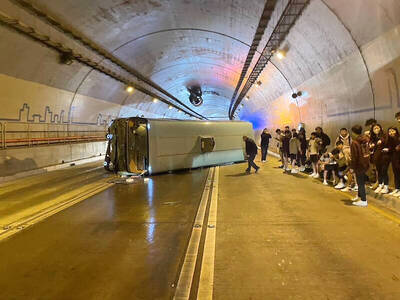The rise in sea levels in the past 80 years has been grossly underestimated and therefore greater action needs to be taken to combat global warming, the dean of National Central University's College of Earth Science Benjamin Chao (
Last year, the UN's Intergovernmental Panel on Climate Change published a Nobel-prize winning report warning that rising sea levels, caused mostly by global warming, could flood parts of the world if not slowed, Chao said.
"Scientific findings previously supported the estimate that sea levels rose 10cm over the past 80 years, but the actual number may be 13cm," said Chao, a former NASA scientist, citing his study which was published in Science magazine on March 13.
Chao's idea for the study came from his observation that the slope of sea level increase was curiously slower from the 1960s to the 1990s relative to pre-1960s and post-1990s periods, "which coincided with a time when the world was rapidly building artificial reservoirs," Chao said.
The observation led him to believe that while rising sea levels were partially brought about by natural causes like the thermal expansion of sea water and the melting of icebergs and ice sheets in Greenland and Antarctica, human factors should also be considered.
Following four months of data compilation with doctoral student Henry Wu (
From his study, Chao postulated that reservoirs may be the largest human factor affecting sea levels.
"The implication is two-fold -- first, the speed at which the sea level is increasing is faster than we had previously calculated," he said.
Before the study it was thought the global sea level increased at 0.18mm per year. However, the new finding showed that the actual annual rise is 0.25cm, Chao said.
"The second implication is that `the more we know, the more we know we don't know,'" he said.
"So far we can account for 0.12cm of the annual rise in sea levels -- while previously that comprised 70 percent of the annual amount. Now it means we don't know more than half the causes of the increase," he said.
Fifty-five percent of the causes are unknown, he said.
Chao said instead of building more dams, humans need to reduce carbon emissions and halt global warming.

The Central Weather Administration (CWA) today issued a "tsunami watch" alert after a magnitude 8.7 earthquake struck off the Kamchatka Peninsula in northeastern Russia earlier in the morning. The quake struck off the east coast of the Kamchatka Peninsula at 7:25am (Taiwan time) at a depth of about 19km, the CWA said, citing figures from the Pacific Tsunami Warning Center. The CWA's Seismological Center said preliminary assessments indicate that a tsunami could reach Taiwan's coastal areas by 1:18pm today. The CWA urged residents along the coast to stay alert and take necessary precautions as waves as high as 1m could hit the southeastern

The National Museum of Taiwan Literature is next month to hold an exhibition in Osaka, Japan, showcasing the rich and unique history of Taiwanese folklore and literature. The exhibition, which is to run from Aug. 10 to Aug. 20 at the city’s Central Public Hall, is part of the “We Taiwan” at Expo 2025 series, highlighting Taiwan’s cultural ties with the international community, National Museum of Taiwan Literature director Chen Ying-fang (陳瑩芳) said. Folklore and literature, among Taiwan’s richest cultural heritages, naturally deserve a central place in the global dialogue, Chen said. Taiwan’s folklore would be immediately apparent at the entrance of the

“China is preparing to invade Taiwan,” Deputy Minister of Foreign Affairs Francois Wu (吳志中) said in an exclusive interview with British media channel Sky News for a special report titled, “Is Taiwan ready for a Chinese invasion?” the Ministry of Foreign Affairs said today in a statement. The 25-minute-long special report by Helen Ann-Smith released yesterday saw Sky News travel to Penghu, Taoyuan and Taipei to discuss the possibility of a Chinese invasion and how Taiwan is preparing for an attack. The film observed emergency response drills, interviewed baseball fans at the Taipei Dome on their views of US President

Speeding and badly maintained roads were the main causes of a school bus accident on a rainy day in Taipei last year that severely injured two people and left 22 with minor injuries, the Taiwan Transportation and Safety Board said. On March 11 last year, a Kang Chiao International School bus overturned inside the Wenshan Tunnel (文山隧道) on the northbound lane of the Xinyi Expressway. The tour bus, owned by Long Lai Co, exceeded the speed limit after entering the tunnel, the board’s investigation found. Sensing that the rear of the vehicle was swaying, the driver attempted to use the service and exhaust